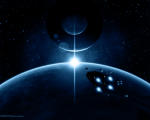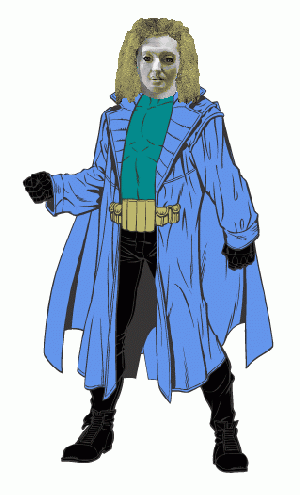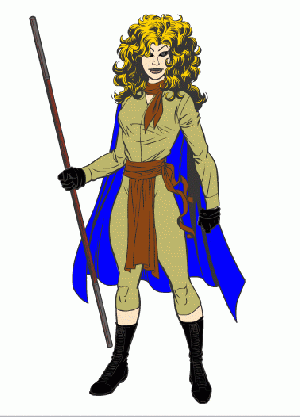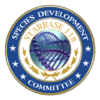Pythron
| Intelligent Lifeform Index |
|---|
| Pythron | |
|---|---|

| |
| Four Letter Code | PYTH |
| Federation Status | Allies of Federation |
| Planet of Origin | Pythro V |
| Encountered | DS9: Rivals |
| T/E Rating | T0/E0 |
| Current Tech Level | N |
| List of Named Pythrons | |

| |
Full ILI Gallery • Permitted Species Gallery | |
- "I welcome you in peace, in the hopes that we part the same."
- a Pythron greeting.
- "I welcome you in peace, in the hopes that we part the same."
- The Pythron are a humanoid species that has some divisions within their society. Why this may cause some internal instability from time to time for the most part they are united in their goals and ideals.
Home System
- Quadrant: Beta
- Location: Rin'Go Sector (coordinates B27-0004-1309)
- Proper Name: Pythro Stellar System
- Star: It orbits a class G (Yellow) star
- Distance from Star: it's orbit is approximately 68 million km
- Companions: There are 9 planets in this system. Theirs is the 5th.
- Moons: it has 5 moons.
Home World
- Proper Name: Pythro V
- Diameter: 19,916 km (12,375 miles)
- Gravity: 1.04 standard gravity with a density of 3.6
- Axial Tilt: 16.8%, with normal terran seasonal changes
- Orbital Period: 418 days
- Rotational Period: 28 hours
- Classification: M
- Surface Water: 49%
- Atmosphere: 1.03% is a standard pressure with 74% nitrogen, 26% oxygen, 2% trace chemicals
- Climate: Fairly diverse climates with few extremes
- Terrain: It has rocky hills, swamps, rain forests and jungles.
- Population: Just over 3 billion
History
Pythro V has been populated for thousands of millennia although recorded history is very recent by comparison. The dominant sentient life forms call themselves Pythrons, a derivation of the word ‘Py-Tor’ meaning ‘The People’ in their ancient Astian tongue. Many Pythrons get a little exasperated explaining to Federation visitors that it has nothing to do with the Terran word ‘python’ – a type of limbless reptile on Earth. The Pythrons were formed from the many nations located across the planet’s surface, all of similar heritage, except for the Vignian tribe whose ancestry split from the main Astian family in the deep past. The Pythrons were assumed to have evolved from a primitive dog-like creature over the course of a few million years, becoming the humanoid bipeds of today. However, no ‘link’ species can be found in the fossil record and there is much scientific discourse about their species’ true bloodlines.
Pythron recorded history begins about 1000 years before the present day, where they first started mastering agriculture. Technological progress was rapid and a modern post-industrial society came about in less than 800 years. After centuries of tribal and national battles for supremacy, a leader emerged from the largest Astian tribe who managed to defeat all raiders to his lands, and established planetary peace for the first time. It was at this time that the wars of religion came to an end, and the pursuit of scientific advancement became a unifying focus.
Pythron civilization eventually advanced to space travel, and soon came to the attention of alien races – both friend and foe. Different star empires made overtures for an alliance with mineral-rich Pythro V. After considering the different threats and bribes, the Pythron leaders accepted an associate status as part of the Federation. However, their initial confidence was severely shaken after an unknown alien force assaulted Pythro V in a major invasion, known as the Dark Times. No Federation forces were nearby to help the Pythrons, and although the indigenous Pythron Armed Forces managed to defeat the invasion before Federation forces arrived in any number, the devastation in life and property was immense. The most important victory was achieved by Pythron troops defending the capital Bantok. Ever since that time, Pythrons have not believed that the Federation can be fully relied upon. To this end, the Pythron Armed Forces are maintained to a high degree and form a major constituent part of Pythron society.
Government
Since the unification of the Pythron nations under Astian dominance, the planet has been ruled by the Inner Council, who are nominated from and elected by the Global Senate. The Global Senate is in turn elected by universal adult suffrage. The Inner Council forms the Executive and the Global Senate the Legislature. The Council nominates one of their members to be President for a four cycle term. The Council also controls the military, the judiciary and the state administration. The vast state bureaucracy filters down to the local level where it liaises with clans and communes to form regional government.
Description
Pythrons are humanoid bipeds with many similar features to Terrans, although are on average taller and broader. Adult females are usually over 6 feet tall, whilst adult males are on average between 6’4” and 7 feet tall. They are pale skinned, have long wavy blond hair and their eye colour is invariably black – making their iris and pupil appear as one.
Physiology
Although often muscular, Pythrons are not out of proportion and indeed have a silhouette similar to that of a tall Klingon. Their voices are not particularly deep, and are regarded as being surprisingly softly spoken for their size.
Pythrons live, on average, between 80 and 100 Terran years, but some have reached 150 years. The only main difference in the aging process between Pythrons and Terrans is an extended middle age. A Pythron will remain physiologically more or less the same from ages 45 to 80, but then begin to age more rapidly over the coming decade. Only Vignian Pythrons have been known to live over 130 years.
The sub-tribe of the Vignians also differ from the Astian majority in lacking any head hair, and being more slender in profile. They are, however, equally resilient.
Psychology
Astian Pythrons have no known psychic or empathetic abilities, but consider themselves to be good strategists and have a developed awareness of other races actions and body-language. This can often help them be good confidence tricksters and hustlers, although this is by no means a race-wide past time and this sometimes leads the overconfident to be tricked themselves. Vignian Pythrons on the other hand are considered to have some latent psychic powers, but are very secretive about it.
Religion
Pythrons are mostly agnostic or atheist. Any earlier religious beliefs have largely been eradicated by the wand of science, and most superstitions are maintained only by the older members of population or in more rural communities. Different nations on Pythro V often had conflicting religions in the past, sometimes going to war over doctrine or custom. Gradually the Thraxian thesis of scientific advancement and space exploration became the overriding strategic goal of the population, and came to predominate.
Mythology
Pythron religion and mythology were always closely linked, although both have now become peripheral to everyday life. The main myth of Pythron pre-history is of the Winged Spirit falling from the sky and battling the Fire Demon of the Mountains. The Winged Spirit was victorious and defeated the Demon, but was mortally wounded in the fight. Its feathers floated to the ground and from these the tribes of Pythro V sprung. This legend is no longer taken literally, and some Pythronic historians have postulated that the winged spirit may have been a spaceship, and the feathers were escape pods but nothing has ever been satisfactorily concluded. This legend certainly predates any indigenous space travel.
Society
Pythron society is very close-knit and family based. Families often consist of up to ten children, partly encouraged in recent decades to try and repopulate the planet after nearly 30% of the population were killed during the attempted alien invasion of the Dark Times. It is often thought that any family not producing over at least 6 children is not trying hard enough. This often puts greater pressure on the children of small families to over-achieve to compensate for non-existent siblings. Families live in extended communes, and often share property and the rearing of children between grandparents, cousins, uncles and aunts. Pythrons are fiercely loyal to their family, clan and planet. Although often reluctant to get involved in off-world problems, they will not hesitate to die to protect those close to them.
Culture
Pythrons have a stylish culture and architecture, and strive to show their aesthetic side. This has often been interpreted by non-Pythrons as a way to dispel the prejudice that Pythrons are large and brutish, and only good as physical tasks like mining and fighting. It is, however, well known that Pythrons are not great singers or dancers.
Customs
As with their defunct religions, many Pythronic customs have been abandoned. The one exception to this rule is a deep regard for traditions of the military. Seen as the ultimate guarantor of Pythronic freedom, the members of the military are highly respected and the awarding of their ceremonial armour to young cadets when they graduate, usually in their late teens, is a major event in Pythronic life.
Technology
Pythronic civilization is technologically advanced compared to many neighbouring systems, but moved forward exponentially after contact and trade with the Federation began. Now capable of building their own warp star ships, the nascent Pythron Fleet is a growing force in the region, but is strictly limited to exploration, trade and defensive roles. On Pythro V itself, the population has largely avoided the construction of vast densely populated cities, and over 80% of the population live in widely scattered communes. Even the capital city of the whole planet, Bantok, is only first among equals of these communes.
Economy
The Pythron economy is largely based upon trade of raw materials, of which Pythro V, its moons and neighbouring planets are rich. The influx of foreign currency into the Pythron Treasury has allowed them to purchase technology and luxuries from other systems. Pythrons are not natural shopkeepers, and prefer to deal in wholesale bulk buying and selling. They are no match for the Ferengis when it comes to striking a deal on-the-spot. Their vast raw material deposits has made Pythro V a tempting target for raiders, pirates and even full-scale alien invasions.
Military
The Pythron Armed Forces are among the best equipped, best trained and toughest troops found in the galaxy. Their soldiers’ natural physical strength, ability to withstand pain and bravery is coupled with the best technology that money can buy. Employment in the military is seen as one of the highest accolades any young Pythron can aspire to. Despite this, Pythro V has managed to remain a democratic state without an over mighty military. It has more of the feel of a peace-loving nation at war, rather than a totalitarian militaristic state at peace. There are, however, many in upper echelons of the Armed Forces who are deeply skeptical about the politicians’ flirtation with closer ties with the Federation. Military service is voluntary, but often oversubscribed.
Federation Intelligence Files
While there have been a number of this species that have served the Federation and Starfleet, LtCmdr. Eyas Wulfantine of the USS Mercury is one of the few in current times that have stood out.
Sources
Both Memory Alpha and Memory Beta were used as references as well as the TV episode DS9: Rivals.
SDC
This file was updated and approved by the SDC on 23 August 2011
| SPECIES PROFILE UPDATED This profile was revised by the Species Development Committee. |
REV 239304.18 | |||
| Please add any new information discovered during the course of a mission or shore leave. | ||||
| SB118-SDC | ||||




